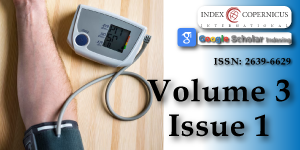The New (2018) European Hypertension Guidelines an overview & comments
Main Article Content
Article Details
Copyright (c) 2019 Mohsen Ibrahim M.

This work is licensed under a Creative Commons Attribution 4.0 International License.
Bryan W, Giuseppe M, Wilko S, Enrico A, Michel Azizi Michel Burnier, Denis L Clement, et al. 2018 ESC/ESH Guidelines for the management of arterial hypertension. European Heart Journal. 2018; 39: 3021–3104.
Ettehad D, Emdin CA, Kiran A, Anderson SG, Callender T, et al. Blood pressure lowering for prevention of cardiovascular disease and death: a systematic review and meta-analysis. Lancet. 2016; 387: 957-967. PubMed: https://www.ncbi.nlm.nih.gov/pubmed/26724178
Thomopoulos C, Parati G, Zanchetti A. Effects of blood pressure-lowering on outcome incidence in hypertension: 5. Head-to-head comparisons of various classes of antihypertensive drugs - overview and meta-analyses. J Hypertens. 2015; 33: 1321-1341. PubMed: https://www.ncbi.nlm.nih.gov/pubmed/26039526
The SPRINT Research Group. A Randomized Trial of Intensive versus Standard Blood-Pressure Control. N Engl J Med. 2015; 373: 2103-2116.
Sundström J, Arima H, Jackson R, Turnbull F, Rahimi K, et al. Blood Pressure Lowering Treatment Trialists' Collaboration. Effects of blood pressure reduction in mild hypertension: a systematic review and meta-analysis. Ann Intern Med. 2015; 162: 184-191. PubMed: https://www.ncbi.nlm.nih.gov/pubmed/25531552
Ibrahim MM. Hypertension in Developing Countries: A major challenge for the future. Curr Hypertens Rep. 2018; 20: 38. PubMed: https://www.ncbi.nlm.nih.gov/pubmed/29717393
Daskalopoulou SS, Dasgupta K, McBrien K, Butalia S, Zarnke KB, et al. Hypertension Canada's 2017 Guidelines for Diagnosis, Risk Assessment, Prevention, and Treatment of Hypertension in Adults. Can J Cardiol. 2017; 33: 557-576. PubMed: https://www.ncbi.nlm.nih.gov/pubmed/28449828
Nerenberg KA, Zarnke KB, Leung AA, Dasgupta K, Butalia S, et al. Hypertension Canada's 2018 guidelines for diagnosis, risk assessment, prevention, and treatment of hypertension in adults and children. Can J Cardiol. 2018; 34: 506–525. PubMed: https://www.ncbi.nlm.nih.gov/pubmed/29731013
Ibrahim, M.M. The Egyptian hypertension society: Egyptian hypertension guidelines. Egyptian Heart Journal. 2014; 66: 79-132.

